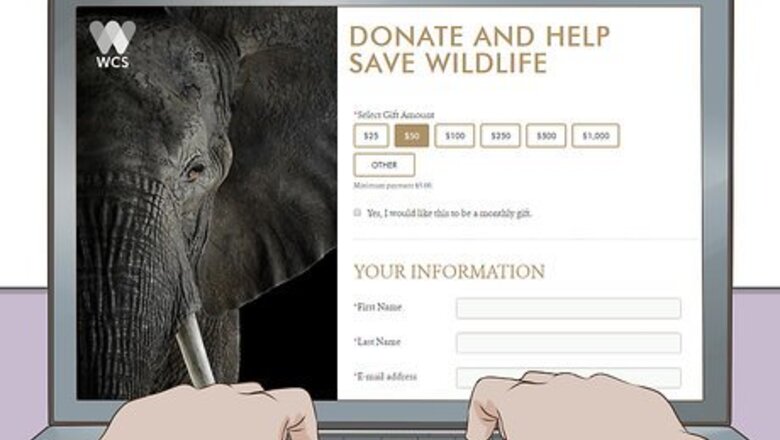
views
Helping Animal Organizations
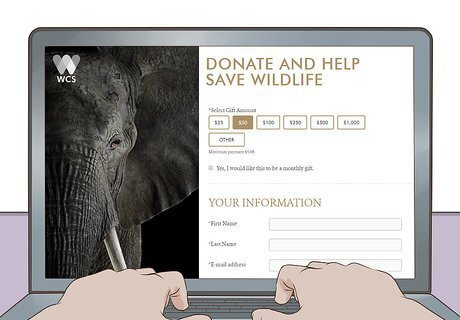
Make a donation to an animal organization. There are local, national, and global organizations that work to protect and help all kinds of animals. Larger organizations like the Wildlife Conservation Society, African Wildlife Foundation, Best Friends Animal Society, and other nonprofits make it easy to donate to their cause online. To make a difference in your own community, donate to a local organization, such as the Humane Society. For instance, make a donation to the Palo Alto Humane Society, an organization in Northern California that aims to keep animals out of shelters. Find their website here: https://www.paloaltohumane.org/ Most organizations allow you to make a one-time donation or recurring donations in an amount you choose. If you donate to a nonprofit or charity, it’s usually tax-deductible.
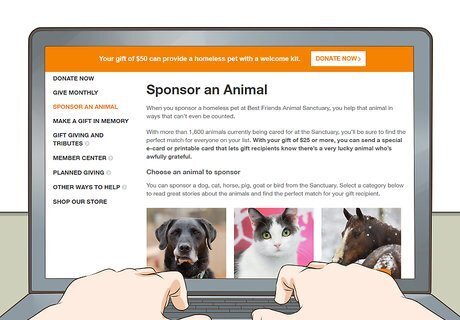
Sponsor an animal in need online. Your support could help animals in shelters find homes, fund spay/neuter programs, provide medicine for animals with special conditions, and much more. See if your local shelter runs GoFundMe campaigns or requests sponsors on Facebook or other social media sites. For example, sponsor a horse, pig, goat, bird, cat, or dog through the Best Friends Animal Sanctuary (https://bestfriends.org/donate/sponsor-animal). You can also support an animal in distress by donating to the Palo Alto Humane Society's pet help program or animal rescue fund. Check their website or Facebook page (https://www.facebook.com/paloaltohumane/) to see which animals currently need help. To sponsor a dog awaiting adoption at Villalobos Rescue Center in New Orleans, LA, go to https://www.vrcpitbull.com/how-you-can-help/sponsor-a-dog/.

Sign a petition to support animal causes you care about. Find a cause you can support, like protecting an endangered species or stopping dog breed discrimination. Best Friends has a handy list of petitions sorted by state on their site: https://support.bestfriends.org/site/SPageServer/?pagename=index. The World Wildlife Fund has national and worldwide petitions you can support: https://www.worldwildlife.org/.
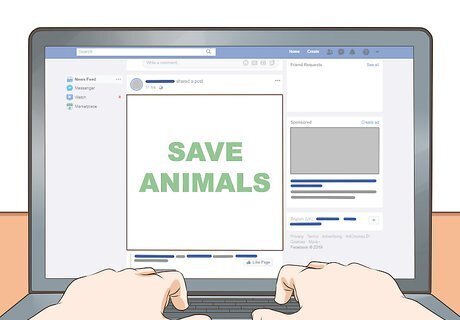
Use social media to spread awareness for animal organizations. If you follow animal organizations on social media, you can repost or retweet their content to show support. Your followers and social media circle will see it and possibly share it themselves. Make sure the content you share is accurate so you’re spreading correct information.
Helping Your Local Community
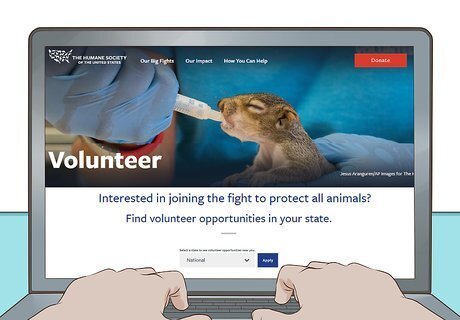
Volunteer at a local organization or shelter. Reach out to your local Humane Society or Society for the Prevention of Cruelty to Animals to learn about volunteering opportunities. They may need help walking dogs, bathing animals, socializing cats, or cleaning cages. If you're in California, volunteer at the Palo Alto Humane Society (https://www.paloaltohumane.org/). If you live in Texas, volunteer at the SPCA (https://www.spca.org/volunteer). To volunteer in Florida, check out the Florida Humane Society (https://www.floridahumanesociety.org/volunteer.html). In New York, volunteer for the Best Friends Animal Society (https://ny.bestfriends.org/get-involved/volunteer).
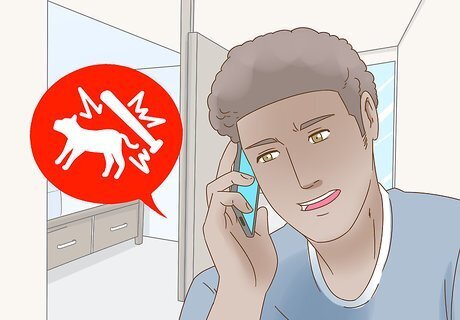
Report animal cruelty. If you’ve noticed signs of animal cruelty, you should protect that animal by reporting it to your local animal control agency or law enforcement. Take notes on what you see: the location, dates and times, descriptions of the abused animal, and the owner’s information. Signs of an abused animal might include open wounds, skin conditions, extreme thinness, or limping. An animal may be being abused or neglected if you notice it tied up outdoors for long periods of time, especially in dirty living conditions or during bad weather.
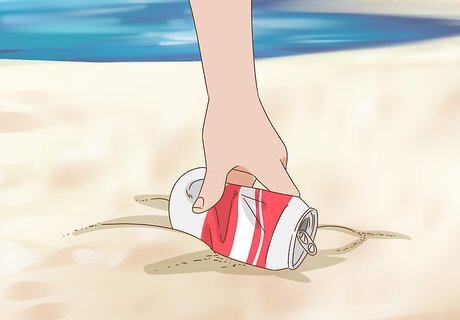
Clean up litter at local parks or the beach. If you see an empty soda can or discarded paper bag, take a second to drop it in a nearby trash can or recycling bin. You can go even further by joining local group cleanups and encouraging your friends to come with you.

Adopt an animal from a local shelter. If you’re ready for a pet, consider adopting one from a shelter. By adopting a pet, you possibly save it from being put down. Giving an animal a loving home will not only benefit its life but enhance yours. Pick an animal that will match your personality, budget, schedule, and living space. Your pet will be happier if it matches your needs and lifestyle.
Feed birds and squirrels. Feeding animals attracts them to your yard, so they can gain habitat in your yard. Don't squirrel-proof your birdfeeders, as this is cruel to squirrels. If you want to keep squirrels away from birdfeeder, feed them in a separate squirrel feeder on a different tree or fence away from the tree with the birdfeeders. Don't feed the animals on a patio or other manmade structure that is far from a tree, as that is unnatural. You can make your own bird and squirrel feeders to make an even bigger change because you are making pollution into usable items!
Making a Global Difference
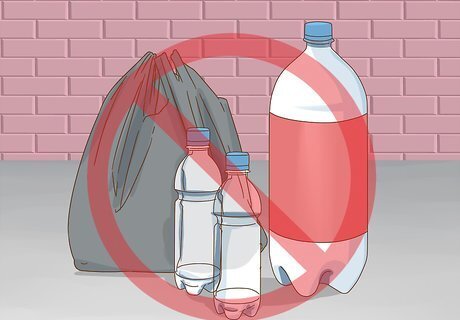
Use fewer plastic products to limit ocean pollution. Reusable water bottles, food containers, and shopping bags help reduce the amount of plastic used that eventually ends up in the ocean. When you do use disposable plastic, recycle it when you can. Some stores charge a tax for using their disposable plastic bags, while others offer shoppers small bonuses for bringing their own.
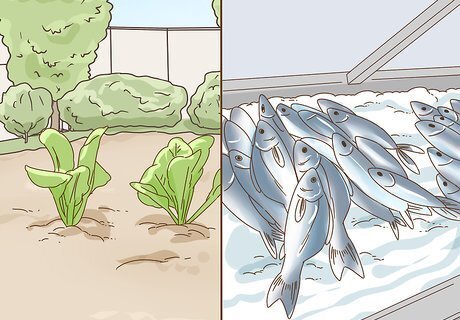
Choose safe and sustainable food to better the environment. This might mean buying local produce from the farmers’ market, growing your own vegetables, buying responsibly caught fish, reducing your intake of red meat, and cooking at home rather than dining out. Storing food properly in your fridge reduces waste, too. Put food that doesn’t require cooking, like yogurt or cheese, on the top shelf where it’s warmest. Food that needs high-temperature cooking, such as meat and seafood, should be stored near the bottom.
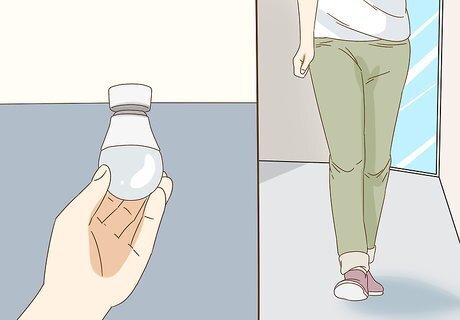
Reduce energy consumption and cut carbon when you can. Simple actions include using energy efficient light bulbs, and walking or biking instead of driving a car. Being more mindful of your energy use will help reduce your “carbon footprint,” positively impacting the environment. Other actions you can take include using a fan instead of the air conditioner, carpooling to your job or school, and air drying laundry instead of using the dryer.
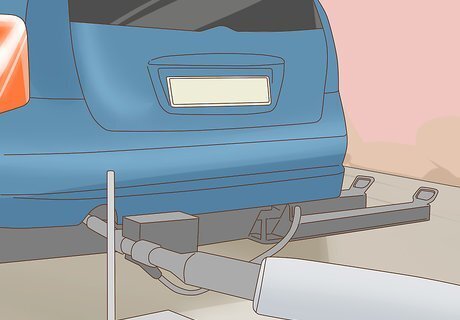
Pass emissions testing for your car. Stay up to date with emissions tests for your car if they are required by your state. Emissions inspections make sure your car is in good shape and help reduce its carbon footprint. If you live in the U.S. or Canada, you can find emissions inspection laws by state or province.



















Comments
0 comment